League Of Olympic Swim Legends: Michael Phelps Tops 200IM Podium With Darnyi & Lochte

What would have unfolded had Tokyo 2020 gone ahead as planned this week – and where would it all have fit in the thread of Olympic swim legends and pioneers like Michael Phelps, Tamas Darnyi and Ryan Lochte? To mark the eight days over which the Tokyo 2020 Olympic Games would have unfolded had the coronavirus pandemic not forced postponement, the team at Swimming World is filling the void with a Virtual Vision Form Guide and League of Olympic Swimming Legends.
Day 6, event 4 – Make Way for the Founder of the Quadruple Crown Club…
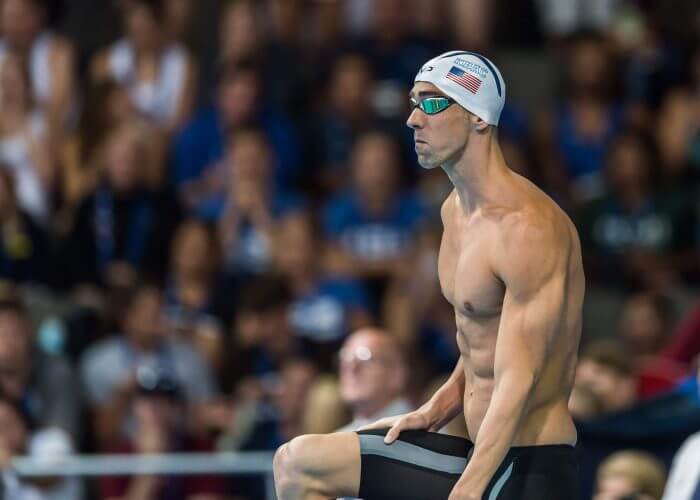
Michael Phelps – Photo Courtesy: Peter H. Bick
Men’s 200m Medley
The Podium
- Michael Phelps (USA)
- Tamas Darnyi (HUN)
- Ryan Lochte (USA)
The Other Finalists (Listed Alphabetically):
- Alex Baumann (CAN)
- Attila Czene (HUN)
- Charlie Hickcox (USA)
- Gunnar Larson (SWE)
- Dick Roth (USA)
- Our Lane 9* place goes to a man who raced before 1200m medley was an Olympic event – and before Phelps he held the record for holding the number of 200IM World records, at 5 (1960-64):
- Ted Stickles (USA)
* – in our series, we will use Lane 9 to add an athlete whose story reflects extraordinary situations of different kinds, including being deprived by those who fell foul of anti-doping rules or by political decisions or, indeed the Olympic program, as well as simple facts such as “he/she was the only other title winner who claimed gold in a WR but didn’t make out top 8 on points”
All-Time Battle Of Olympic Swim Legends Goes To Michael Phelps
Really, we could just type Michael Phelps in this space and say nothing else. His gold-medal status here does not need to be argued, but for the sake of this exercise, we will remain consistent. Phelps (2004/2008/2012/2016) is the only swimmer to win the same event at four consecutive Games, and each of his triumphs was convincing. The closest decision was by .63 in 2012, the others by well over a second.
Phelps, coached by Bob Bowman, set the first of his eight world records in 2003 and was the first person to break 1:58, 1:57, 1:56 and 1:55. Although Ryan Lochte later took the world record from Phelps and beat him at the 2011 World Championships, Phelps always shined on the Olympic stage and defeated his rival en route to each of his Olympic golds.
Hungarian Tamas Darnyi earned the silver medal behind Phelps, the medley sensation from the late 1980s into the early 1990s relying on his gold medals in 1988 and 1992. Darnyi, coached by Tamas Szechy, set three world records and became the first man to crack the two-minute barrier when he clocked 1:59.36 at the 1991 World Championships in Perth.
Based on his consistency through multiple Olympiads, Lochte, coached by Gregg Troy, picked up the bronze medal. The American was the silver medalist in 2004 and 2012 and added a bronze medal in 2008. Lochte set two world records in the event, including the current standard of 1:54.00. He also advanced to the final of the 200 IM in 2016, finishing fifth.
With this win, Michael Phelps has taken gold in three solo events in our League of legends, after 400IM and 200 ‘fly. His journey did not come without sacrifice and mental-health challenges, a theme that the most decorated Olympian of all-time has made a part of his legacy, this past week marking the launch of “The Weight of Gold”, a documentary that sparked this response.
The Last Gold Of Four Over 200IM – Michael Phelps At Rio 2016:
The Curtain Closes On One Of The Greatest Rivalries
– Contemporary Report, by John Lohn, Rio 2016
One day, perhaps a production company will pay all the rights fees required for footage and mesh together a DVD. It can be titled, “The Greatest Rivalry.” Care to guess the subject matter? Hint: It has to do with what unfolded – for the last time – on Night Six of the Olympic Games at the Rio Aquatics Centre.
For more than a decade, we’ve sat back and watched them entertain, rarely – if ever – providing something less than award-caliber stuff. If Part One of their show was a one-sided affair, it set the scene for what was to come. Part Two certainly brought more drama, the action scenes hitting their peak.
Now, the curtain is closed.
The Michael Phelps – Ryan Lochte rivalry is no more, the last clash of the American superstars booked into history on Thursday night with Phelps capturing the 22nd gold medal of his career, and the 26th overall medal. Heading for a second retirement, Phelps left no doubt about the outcome, putting together another virtuoso performance that ended in a time of 1:54.66, the fourth-fastest of his career and No. 8 all-time for the 31-year-old. It was his 15th individual Olympic medal, breaking the Olympic record off 14, held by former Soviet gymnast Larisa Latynina.
The bummer to the narrative was Lochte’s fifth-place finish in 1:57.47, the 32-year-old unable to maintain his lead at the midway point and his third-place standing going into the final lap. Nonetheless, to discount Lochte’s significance in the event, and to the best rivalry the sport has seen, would be a narrow-view focus. A career is not made on one race, but in totality, and Lochte’s portfolio rates in the top 1%.
With Michael Phelps notching a 1.95-second margin of victory, not far off his record 2.29-second triumph from Beijing in 2008, the silver medal went to Japan’s Kosuke Hagino in 1:56.61, the bronze to China’s Wang Shun in 1:57.05.
“I kind of knew when I first started coming back that it wasn’t going to be an easy process and I was going to force myself to go through pain I didn’t really want to go through,” Phelps said. “But if I wanted the end result, I had to. I was at a point in my life that I was ready to do that. I came back the heaviest I had ever been. I’ve said it a bunch: I felt like a kid again. I felt like I did when I was 18.
“It was some of the best training of my life. That was the only reason I was able to get back to where I once was. To be able to race this level consistently. I can recall a grand prix in Charlotte, and I thought, ‘what the hell am I doing back swimming again? I’m terrible.’ I was frustrated. But I decided to trust (coach Bob Bowman). For some reason, I trusted him when I was 11 years old and he’s not let me down once since, and I knew he would not let me down this time.”
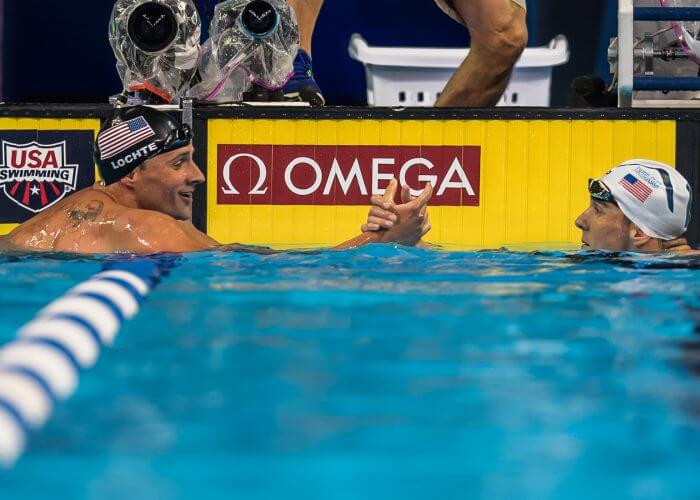
Michael Phelps and Ryan Lochte – brothers in medley – Photo Courtesy: Peter H. Bick
In the past, Michael Phelps has restrained his emotions during the medals ceremony, a smile pretty much the extent of things. This week has been different. Tears appeared in his eyes during his first three ceremonies in Rio, but the medley elicited more, Phelps choking up at the playing of the Star Spangled Banner.
It may not have been the fairytale end to the rivalry, but it wasn’t without history. With his latest gold, Phelps became the first swimmer to win the same event at four consecutive Olympiads, acknowledging that achievement with a four-finger flash to the crowd of 14,000. Phelps joined fellow Americans Al Oerter (discus; 1956-68) and Carl Lewis (long jump; 1984-96) as the only Olympians to pull off The Quad. By the way, he’ll have the chance to do it again in the 100 butterfly, that final set for Friday night.
“I say this a lot, but every single day, I’m living a dream come true,” Phelps said. “As a kid, I wanted to do something that no one had ever done before, and I’m enjoying it. Being able to finish how I want is just something very special to me, and this is why you are seeing more and more emotion on the medal podium.”
Even if the last faceoff wasn’t epic, Phelps and Lochte engaged in a spectacular two-man act for a 12-year period that began in 2004. The show came off Broadway for a brief while, when Phelps retired following the London Games in 2012, but it was rekindled in time for a final run.
The finale was watched by millions across the globe, and while there was the occasional guest appearance (Hagino of late and Hungarian Laszlo Cseh in earlier episodes), Phelps and Lochte did just fine manning the spotlight by themselves.
In the Playbill for their last showdown, a special section could be found that detailed their extraordinary success. Updated after Phelps’ victory, it reads as such:
Between them, Phelps and Lochte boast the 16-fastest performances of all-time, and account for the only efforts under the 1:55 barrier. Expanding, they have 26 of the fastest 35 outings, 34 of the quickest 50 and more than half (not a typo) of the top 100.
While Phelps has four Olympic titles in the 200 medley, Lochte’s trophy case includes two silver medals and a bronze in the event. Together, they’ve accounted for 38 Olympic medals – 26 for Phelps and 12 for Lochte, the second-highest total for a swimmer.
They combined for every world title dating to the 2003 World Championships in Barcelona. While Phelps walked away with gold medals in 2003, 2005 and 2007, Lochte won every world championship from 2009 through 2015 – four in all.
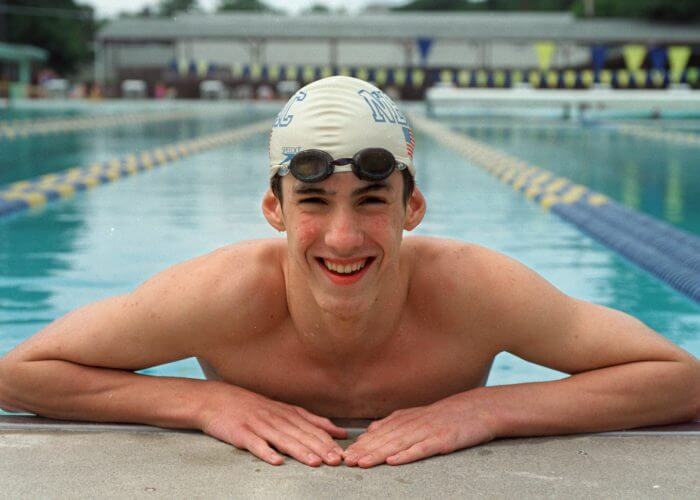
Michael Phelps – on the way to his first games at 15 – Photo Courtesy: Baltimore Sun
At the 2011 World Championships in Shanghai, Ryan Lochte and Michael Phelps engaged in their finest duel. While Lochte lowered the world record to 1:54.00, Phelps posted the fastest time of his career, a clocking of 1:54.16.
“It’s crazy to believe Ryan and I have been on the Olympic Team and National Team together since 2004,” Phelps said.
“That’s the longest, I think, continuous competitor I’ve ever had. Definitely one of the toughest, too. It’s crazy to think about some of that stuff. But it’s also really cool because I’ve been able to do everything I wanted. It all started as a kid. I wasn’t afraid.”
Now that it’s over, it’s kind of sad for the sport, huh? Then again, that depends on the vantage point. Sure, it’s a loss knowing they’ll never go into the breaststroke leg of a medley in a dead heat, each man looking for that smallest crack of daylight. Sure, we’ll miss the banter between them, a little bit of joking and a lot of mutual respect. But all things end, and the impact they’ve had on the sport? That’s going nowhere.
When this rivalry was born on the road to the Athens Olympics in 2004, it was lopsided in nature. Lochte wasn’t at the level of Phelps. Work needed to be done to cut the deficit, and it would take time. So as Phelps rolled along, Lochte trained his way into someone capable of giving the G.O.A.T. a challenge. Eventually, the result was a global standard for Lochte and a defeat of the Big Man at the World Champs in Shanghai.
The Phelps-Lochte tale, on the big stage, was an illustration of one of Phelps’ primary goals: Grow the sport. He made Lochte into a better athlete by raising the proverbial bar, and in itself, that made swimming better from an internal standpoint. Other swimmers understood that Phelps knew no boundaries on his ambitions, and recognized – through Lochte’s determination – that previously discounted aspirations were doable. Wait, someone can challenge Michael Phelps? Lochte basically said, and showed: “Hell, yes!”
“Going against him is a dream come true,” Lochte said of his compatriot.
“Especially what he has done in the sport. He has changed it. He’s one of the best, not swimmer ever, best athlete in the Olympics. For me, being able to push him for so many years, we bring the best out of each other.”
Outside of the world of international competition, Michael Phelps and Ryan Lochte have put kids in the pool. USA Swimming has experienced a spike in membership during their careers, enhanced boosts coming in Olympic years. It’s been as simple as that little kid sitting in front of the TV turning to mom and dad, and saying: “Sign me up. I want to win medals like those guys.”
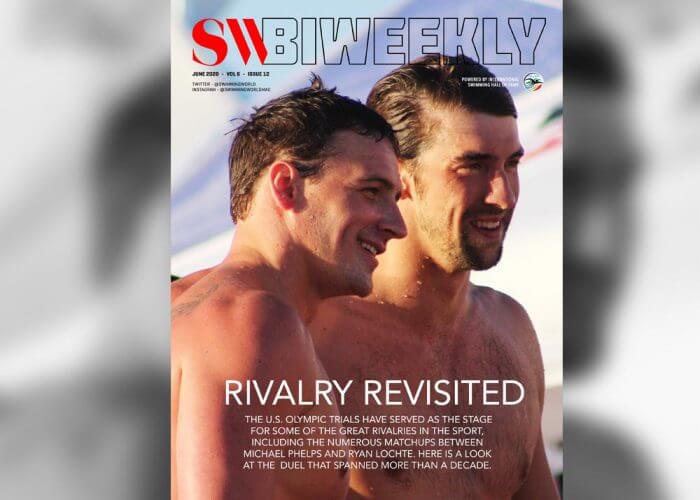 Then there’s the coverage aspect. Before Phelps, and with the help of Lochte as his profile soared, finding swimming on television in the United States was…well, it wasn’t going to happen. These days, coverage can be found of USA Swimming Pro Series stops, U.S. Nationals, the World Championships and the Pan Pacific Champs. In Olympic years, swimming rates at the top of the list of most-watched sports. Heck, the National Broadcasting Company (NBC), the United States rights holder to the Games, convinced the International Olympic Committee to have finals start at 10 o’clock in Rio de Janeiro.
Then there’s the coverage aspect. Before Phelps, and with the help of Lochte as his profile soared, finding swimming on television in the United States was…well, it wasn’t going to happen. These days, coverage can be found of USA Swimming Pro Series stops, U.S. Nationals, the World Championships and the Pan Pacific Champs. In Olympic years, swimming rates at the top of the list of most-watched sports. Heck, the National Broadcasting Company (NBC), the United States rights holder to the Games, convinced the International Olympic Committee to have finals start at 10 o’clock in Rio de Janeiro.
Why?
By getting that schedule arranged, it could show the swimming action in not only a live format, but in primetime. What does primetime mean? Bigger advertising dollars.
With Michael Phelps going the retirement route, Lochte is uncertain about his end date. He has not ruled out a run toward the 2020 Games in Tokyo, but he also recognizes the need to take a step back, recharge and reassess.
“I wish that end was a lot better,” Lochte said.
“It is what it is. My swimming career has been good and I’m so thankful for the gifts and talent that I’ve been given. But I had to work at it. Day in and day out for so many years. I just wish I ended up better.
“I can’t say this is over. If anything, I think especially that race, it helped motivate me. There are a lot of things I need to change in the next four years if I want to come back into the sport. But for right now, I think I need a break mentally. Who knows. It could be for a day. It could be ten days, two years. I just know I need physical and mental tapering.”
Whatever happens, it’s a guarantee that Phelps and Lochte will be celebrated at future Olympic Trials, regaled through tales of their duels and given the chance to take a bow.
They’ve earned it.
And another great medley moment in Olympic history:
When Tamas Darnyi Passed & Crushed His Rivals On The Last Length
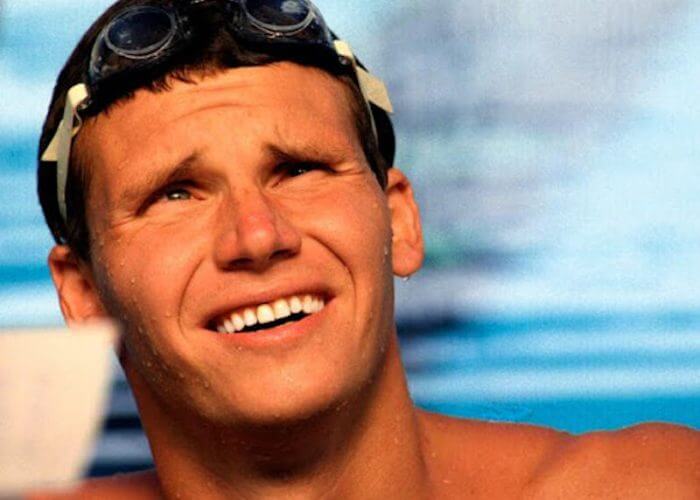
Tamas Darnyi – Photo Courtesy: Hungarian Swimming Federation
1988 Seoul – Men 200m Individual Medley – Athletes: 56 Nations: 35
- 2:00.17wr Tamas Darnyi HUN
- 2:01.61 Patrick Kuhl GDR
- 2:02.40 Vadim Yaroshchuk URS
2:02.92 Mikhail Zubkov URS
2:03.81 Peter Bermel FRG
2:04.34 Robert Bruce AUS
2:04.82 Raik Hannemann GDR
2:06.35 Gary Anderson CAN
Date of final: September 25, 1988
Between 1982 and 1993, spanning the entire international career of Tamas Darnyi, the Hungarian never lost a medley race. In 1986, he defeated Olympic champion Alex Baumann (CAN) to win both medley crowns at the World Championships and then, in 1987, he took the world records away from the Canadian to lift both European titles.
Four days after storming to a world-record victory of 4:14.75 in the 400m medley, Darnyi, born in Budapest the son of a steel-factory worker, let his rivals do all the work ahead of him in the final of the 200m.
On butterfly, Vadim Yaroshchuk (URS) led the way in 25.60, with Darnyi in fifth, on 27.06. After backstroke, the Russian was still ahead, on 56.24, but Darnyi had crept up to second, on 57.33, having just passed Patrick Kuehl, on 57.56, just before the turn top breaststroke. Yaroshchuk’s lead, at 1:32.20, was cut back to just 0.17sec by the final turn, with Kuehl edging ahead of Darnyi, 1:32.37 to 1:32.44.
Off the wall, the man who would become the most successful medley swimmer of the 20th Century reduced his rivals to second-class with a phenomenal 27.73sec homecoming split that delivered the gold and a world record of 2:00.17, 0.39sec inside the standard he had set at the European Championships a year earlier.
Silver went to Kuehl, bronze to Yaroshchuk in the first Olympic 200 medley final to ever to unfold without an American on the podium, and, indeed, without an American in the final at all, 400m silver medallist Dave Wharton having missed the grade in heats. Since 1988, Americans have made every final – and won four titles – all of them to our League of Legends champion, Michael Phelps.
At the 1991 World Championships in Perth, Western Australia, Darnyi became the first man to break 2 minutes over 200-m medley, with a sensational title win of 1:59.36 (after a 4:12.36 400IM five days earlier):



